Ensuring Person-Centred Care: Supporting Adults in Residential Care
VerifiedAdded on 2023/06/09
|14
|3952
|198
Report
AI Summary
This report provides an overview of ensuring a person-centered approach to supporting adults in residential care. It explains the current provision of services, analyzes the historical development of the adult residential care sector, and evaluates its wider role in health and social care. The report also examines how legislation, regulation, codes of practice, and standards underpin service delivery, reviewing their impact and evaluating the challenges in their implementation. Furthermore, it discusses how workers in adult residential care ensure inclusive and person-centered practices, analyzing different approaches and their implications. The report also reflects on individual contributions to service delivery, emphasizing principles and values required in adult residential care settings, and highlights the importance of meeting individual needs and preferences through effective communication and interaction. Desklib provides access to this and other solved assignments to support students in their studies.
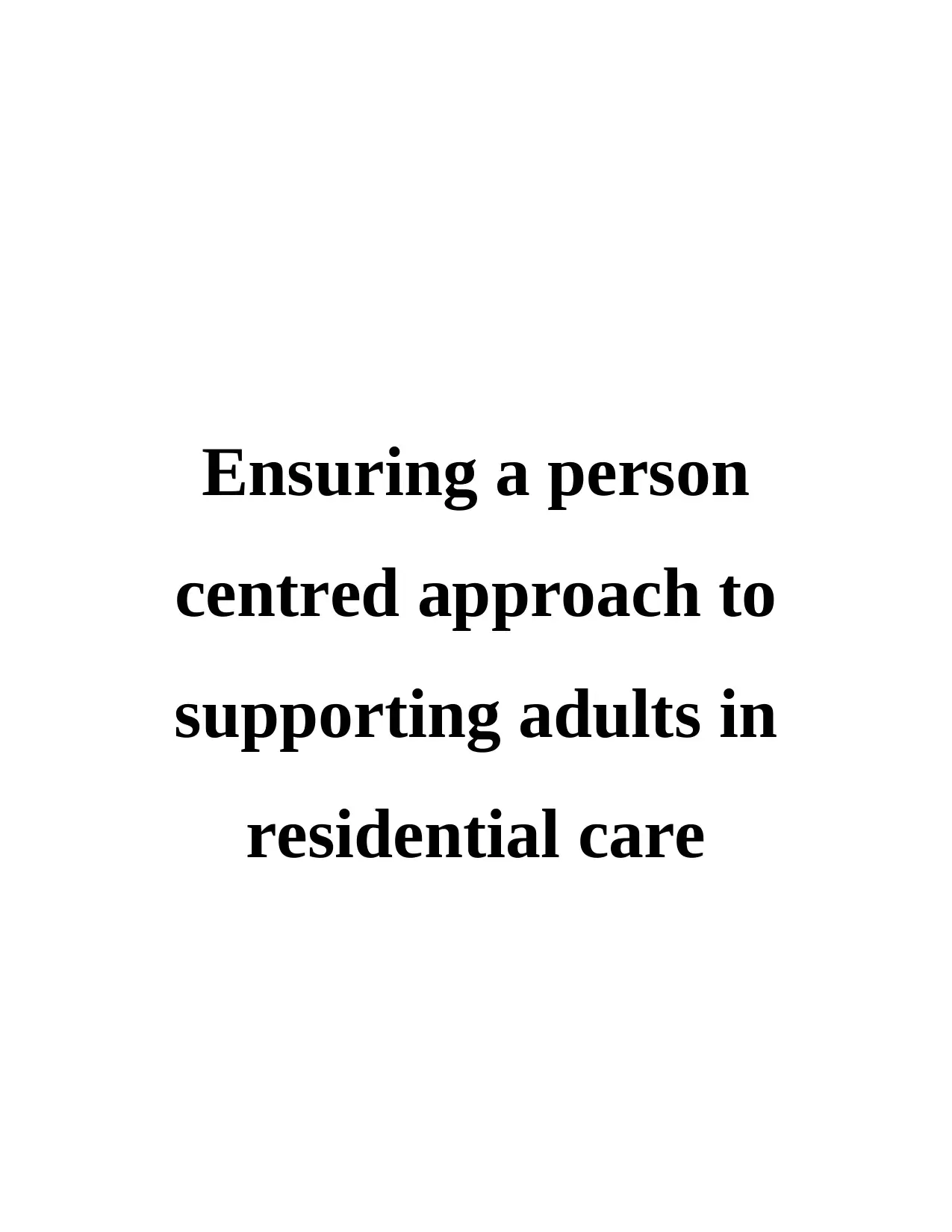
Ensuring a person
centred approach to
supporting adults in
residential care
centred approach to
supporting adults in
residential care
Paraphrase This Document
Need a fresh take? Get an instant paraphrase of this document with our AI Paraphraser
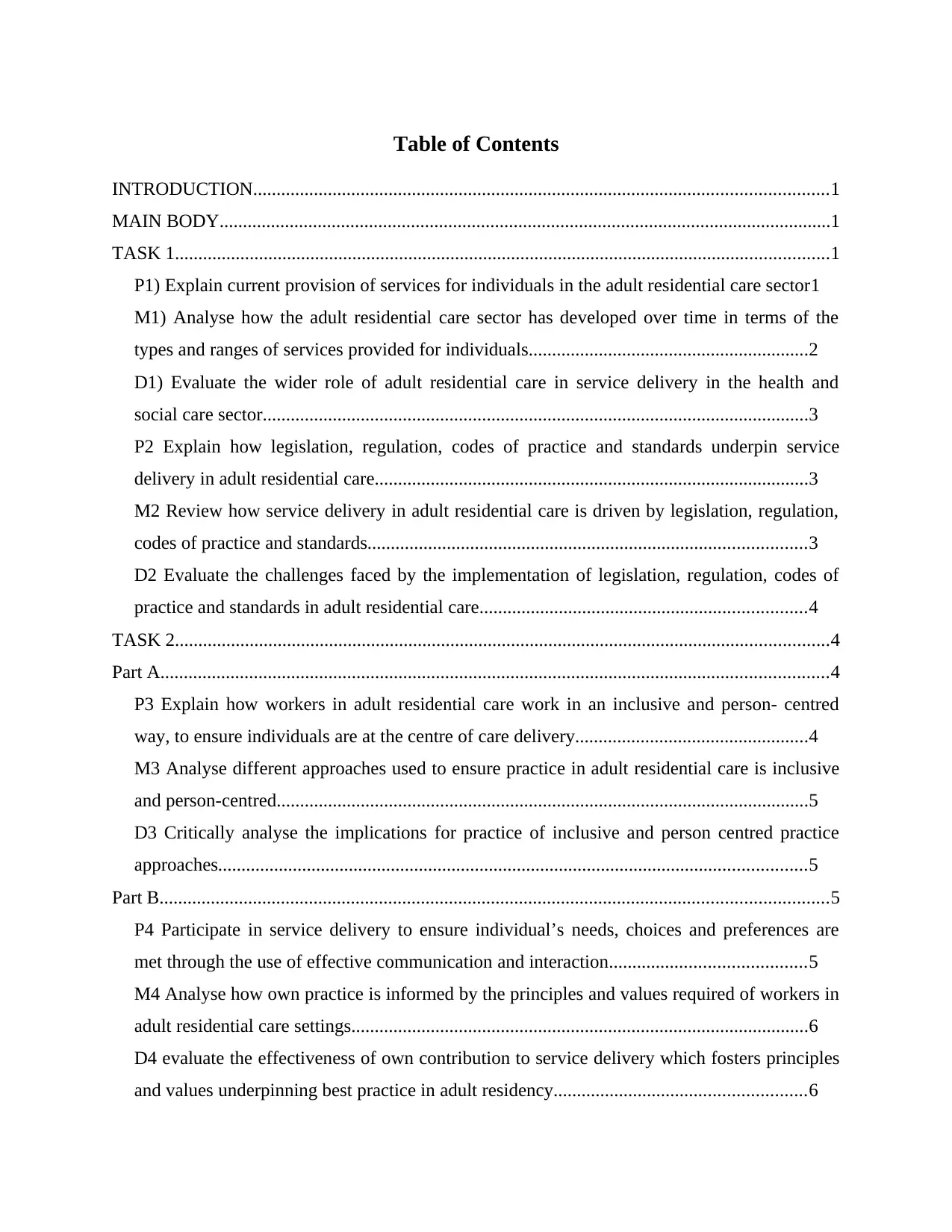
Table of Contents
INTRODUCTION...........................................................................................................................1
MAIN BODY...................................................................................................................................1
TASK 1............................................................................................................................................1
P1) Explain current provision of services for individuals in the adult residential care sector1
M1) Analyse how the adult residential care sector has developed over time in terms of the
types and ranges of services provided for individuals............................................................2
D1) Evaluate the wider role of adult residential care in service delivery in the health and
social care sector.....................................................................................................................3
P2 Explain how legislation, regulation, codes of practice and standards underpin service
delivery in adult residential care.............................................................................................3
M2 Review how service delivery in adult residential care is driven by legislation, regulation,
codes of practice and standards..............................................................................................3
D2 Evaluate the challenges faced by the implementation of legislation, regulation, codes of
practice and standards in adult residential care......................................................................4
TASK 2............................................................................................................................................4
Part A...............................................................................................................................................4
P3 Explain how workers in adult residential care work in an inclusive and person- centred
way, to ensure individuals are at the centre of care delivery..................................................4
M3 Analyse different approaches used to ensure practice in adult residential care is inclusive
and person-centred..................................................................................................................5
D3 Critically analyse the implications for practice of inclusive and person centred practice
approaches..............................................................................................................................5
Part B...............................................................................................................................................5
P4 Participate in service delivery to ensure individual’s needs, choices and preferences are
met through the use of effective communication and interaction..........................................5
M4 Analyse how own practice is informed by the principles and values required of workers in
adult residential care settings..................................................................................................6
D4 evaluate the effectiveness of own contribution to service delivery which fosters principles
and values underpinning best practice in adult residency......................................................6
INTRODUCTION...........................................................................................................................1
MAIN BODY...................................................................................................................................1
TASK 1............................................................................................................................................1
P1) Explain current provision of services for individuals in the adult residential care sector1
M1) Analyse how the adult residential care sector has developed over time in terms of the
types and ranges of services provided for individuals............................................................2
D1) Evaluate the wider role of adult residential care in service delivery in the health and
social care sector.....................................................................................................................3
P2 Explain how legislation, regulation, codes of practice and standards underpin service
delivery in adult residential care.............................................................................................3
M2 Review how service delivery in adult residential care is driven by legislation, regulation,
codes of practice and standards..............................................................................................3
D2 Evaluate the challenges faced by the implementation of legislation, regulation, codes of
practice and standards in adult residential care......................................................................4
TASK 2............................................................................................................................................4
Part A...............................................................................................................................................4
P3 Explain how workers in adult residential care work in an inclusive and person- centred
way, to ensure individuals are at the centre of care delivery..................................................4
M3 Analyse different approaches used to ensure practice in adult residential care is inclusive
and person-centred..................................................................................................................5
D3 Critically analyse the implications for practice of inclusive and person centred practice
approaches..............................................................................................................................5
Part B...............................................................................................................................................5
P4 Participate in service delivery to ensure individual’s needs, choices and preferences are
met through the use of effective communication and interaction..........................................5
M4 Analyse how own practice is informed by the principles and values required of workers in
adult residential care settings..................................................................................................6
D4 evaluate the effectiveness of own contribution to service delivery which fosters principles
and values underpinning best practice in adult residency......................................................6

P5 Explain different aspects of own practice which is underpinned by principles and values
required of workers in adult residential care settings.............................................................6
Observation one...............................................................................................................................8
Observation two...............................................................................................................................8
REFERENCES................................................................................................................................9
required of workers in adult residential care settings.............................................................6
Observation one...............................................................................................................................8
Observation two...............................................................................................................................8
REFERENCES................................................................................................................................9
⊘ This is a preview!⊘
Do you want full access?
Subscribe today to unlock all pages.

Trusted by 1+ million students worldwide
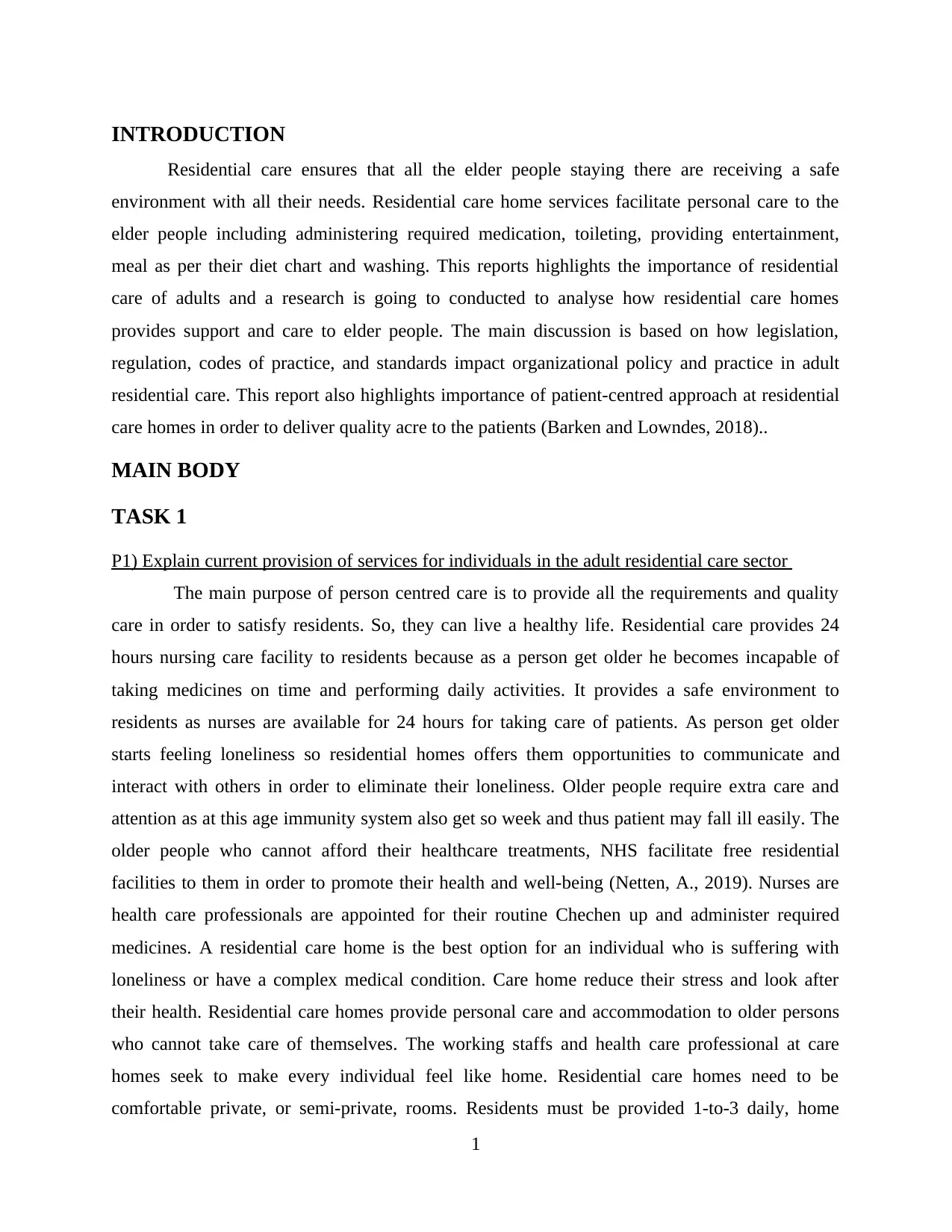
INTRODUCTION
Residential care ensures that all the elder people staying there are receiving a safe
environment with all their needs. Residential care home services facilitate personal care to the
elder people including administering required medication, toileting, providing entertainment,
meal as per their diet chart and washing. This reports highlights the importance of residential
care of adults and a research is going to conducted to analyse how residential care homes
provides support and care to elder people. The main discussion is based on how legislation,
regulation, codes of practice, and standards impact organizational policy and practice in adult
residential care. This report also highlights importance of patient-centred approach at residential
care homes in order to deliver quality acre to the patients (Barken and Lowndes, 2018)..
MAIN BODY
TASK 1
P1) Explain current provision of services for individuals in the adult residential care sector
The main purpose of person centred care is to provide all the requirements and quality
care in order to satisfy residents. So, they can live a healthy life. Residential care provides 24
hours nursing care facility to residents because as a person get older he becomes incapable of
taking medicines on time and performing daily activities. It provides a safe environment to
residents as nurses are available for 24 hours for taking care of patients. As person get older
starts feeling loneliness so residential homes offers them opportunities to communicate and
interact with others in order to eliminate their loneliness. Older people require extra care and
attention as at this age immunity system also get so week and thus patient may fall ill easily. The
older people who cannot afford their healthcare treatments, NHS facilitate free residential
facilities to them in order to promote their health and well-being (Netten, A., 2019). Nurses are
health care professionals are appointed for their routine Chechen up and administer required
medicines. A residential care home is the best option for an individual who is suffering with
loneliness or have a complex medical condition. Care home reduce their stress and look after
their health. Residential care homes provide personal care and accommodation to older persons
who cannot take care of themselves. The working staffs and health care professional at care
homes seek to make every individual feel like home. Residential care homes need to be
comfortable private, or semi-private, rooms. Residents must be provided 1-to-3 daily, home
1
Residential care ensures that all the elder people staying there are receiving a safe
environment with all their needs. Residential care home services facilitate personal care to the
elder people including administering required medication, toileting, providing entertainment,
meal as per their diet chart and washing. This reports highlights the importance of residential
care of adults and a research is going to conducted to analyse how residential care homes
provides support and care to elder people. The main discussion is based on how legislation,
regulation, codes of practice, and standards impact organizational policy and practice in adult
residential care. This report also highlights importance of patient-centred approach at residential
care homes in order to deliver quality acre to the patients (Barken and Lowndes, 2018)..
MAIN BODY
TASK 1
P1) Explain current provision of services for individuals in the adult residential care sector
The main purpose of person centred care is to provide all the requirements and quality
care in order to satisfy residents. So, they can live a healthy life. Residential care provides 24
hours nursing care facility to residents because as a person get older he becomes incapable of
taking medicines on time and performing daily activities. It provides a safe environment to
residents as nurses are available for 24 hours for taking care of patients. As person get older
starts feeling loneliness so residential homes offers them opportunities to communicate and
interact with others in order to eliminate their loneliness. Older people require extra care and
attention as at this age immunity system also get so week and thus patient may fall ill easily. The
older people who cannot afford their healthcare treatments, NHS facilitate free residential
facilities to them in order to promote their health and well-being (Netten, A., 2019). Nurses are
health care professionals are appointed for their routine Chechen up and administer required
medicines. A residential care home is the best option for an individual who is suffering with
loneliness or have a complex medical condition. Care home reduce their stress and look after
their health. Residential care homes provide personal care and accommodation to older persons
who cannot take care of themselves. The working staffs and health care professional at care
homes seek to make every individual feel like home. Residential care homes need to be
comfortable private, or semi-private, rooms. Residents must be provided 1-to-3 daily, home
1
Paraphrase This Document
Need a fresh take? Get an instant paraphrase of this document with our AI Paraphraser
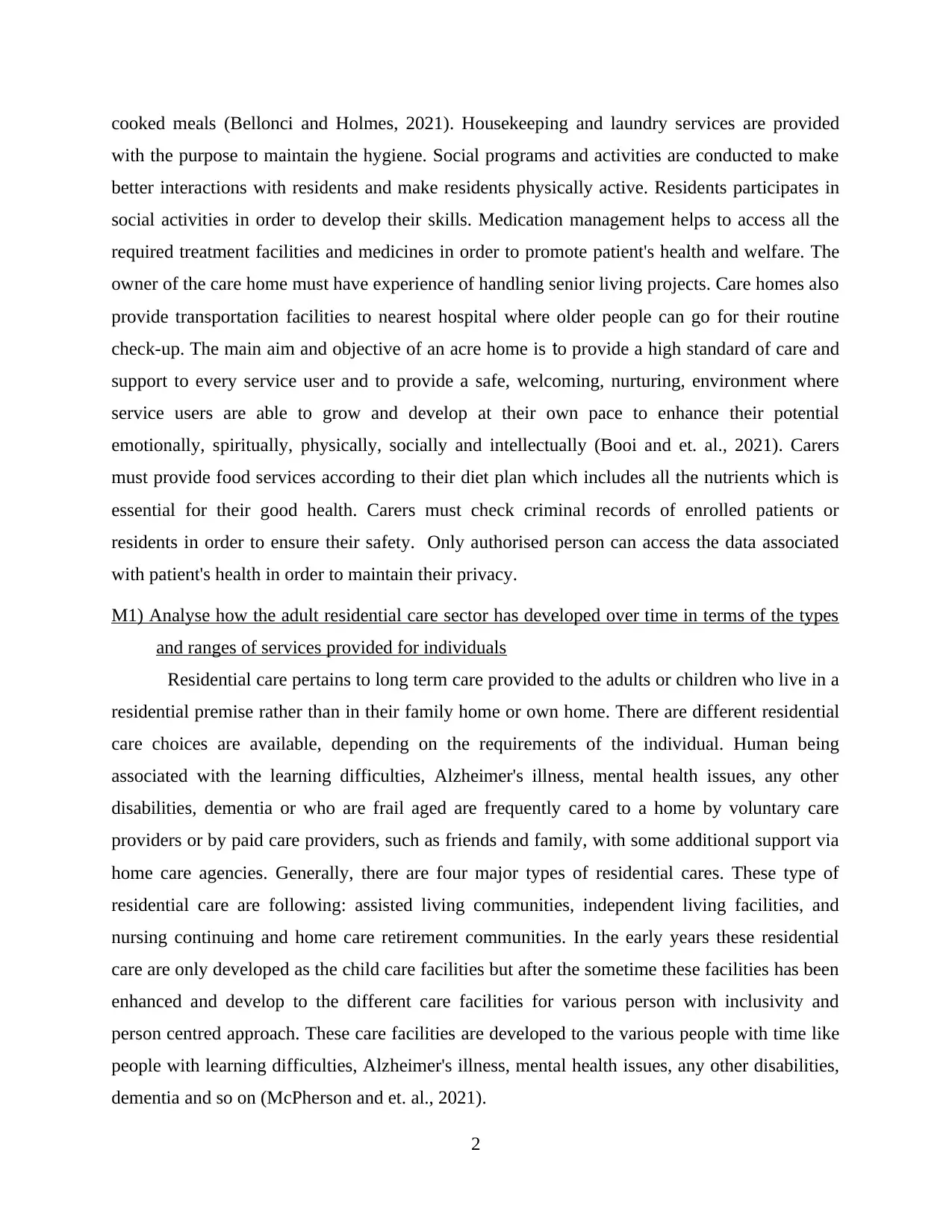
cooked meals (Bellonci and Holmes, 2021). Housekeeping and laundry services are provided
with the purpose to maintain the hygiene. Social programs and activities are conducted to make
better interactions with residents and make residents physically active. Residents participates in
social activities in order to develop their skills. Medication management helps to access all the
required treatment facilities and medicines in order to promote patient's health and welfare. The
owner of the care home must have experience of handling senior living projects. Care homes also
provide transportation facilities to nearest hospital where older people can go for their routine
check-up. The main aim and objective of an acre home is to provide a high standard of care and
support to every service user and to provide a safe, welcoming, nurturing, environment where
service users are able to grow and develop at their own pace to enhance their potential
emotionally, spiritually, physically, socially and intellectually (Booi and et. al., 2021). Carers
must provide food services according to their diet plan which includes all the nutrients which is
essential for their good health. Carers must check criminal records of enrolled patients or
residents in order to ensure their safety. Only authorised person can access the data associated
with patient's health in order to maintain their privacy.
M1) Analyse how the adult residential care sector has developed over time in terms of the types
and ranges of services provided for individuals
Residential care pertains to long term care provided to the adults or children who live in a
residential premise rather than in their family home or own home. There are different residential
care choices are available, depending on the requirements of the individual. Human being
associated with the learning difficulties, Alzheimer's illness, mental health issues, any other
disabilities, dementia or who are frail aged are frequently cared to a home by voluntary care
providers or by paid care providers, such as friends and family, with some additional support via
home care agencies. Generally, there are four major types of residential cares. These type of
residential care are following: assisted living communities, independent living facilities, and
nursing continuing and home care retirement communities. In the early years these residential
care are only developed as the child care facilities but after the sometime these facilities has been
enhanced and develop to the different care facilities for various person with inclusivity and
person centred approach. These care facilities are developed to the various people with time like
people with learning difficulties, Alzheimer's illness, mental health issues, any other disabilities,
dementia and so on (McPherson and et. al., 2021).
2
with the purpose to maintain the hygiene. Social programs and activities are conducted to make
better interactions with residents and make residents physically active. Residents participates in
social activities in order to develop their skills. Medication management helps to access all the
required treatment facilities and medicines in order to promote patient's health and welfare. The
owner of the care home must have experience of handling senior living projects. Care homes also
provide transportation facilities to nearest hospital where older people can go for their routine
check-up. The main aim and objective of an acre home is to provide a high standard of care and
support to every service user and to provide a safe, welcoming, nurturing, environment where
service users are able to grow and develop at their own pace to enhance their potential
emotionally, spiritually, physically, socially and intellectually (Booi and et. al., 2021). Carers
must provide food services according to their diet plan which includes all the nutrients which is
essential for their good health. Carers must check criminal records of enrolled patients or
residents in order to ensure their safety. Only authorised person can access the data associated
with patient's health in order to maintain their privacy.
M1) Analyse how the adult residential care sector has developed over time in terms of the types
and ranges of services provided for individuals
Residential care pertains to long term care provided to the adults or children who live in a
residential premise rather than in their family home or own home. There are different residential
care choices are available, depending on the requirements of the individual. Human being
associated with the learning difficulties, Alzheimer's illness, mental health issues, any other
disabilities, dementia or who are frail aged are frequently cared to a home by voluntary care
providers or by paid care providers, such as friends and family, with some additional support via
home care agencies. Generally, there are four major types of residential cares. These type of
residential care are following: assisted living communities, independent living facilities, and
nursing continuing and home care retirement communities. In the early years these residential
care are only developed as the child care facilities but after the sometime these facilities has been
enhanced and develop to the different care facilities for various person with inclusivity and
person centred approach. These care facilities are developed to the various people with time like
people with learning difficulties, Alzheimer's illness, mental health issues, any other disabilities,
dementia and so on (McPherson and et. al., 2021).
2
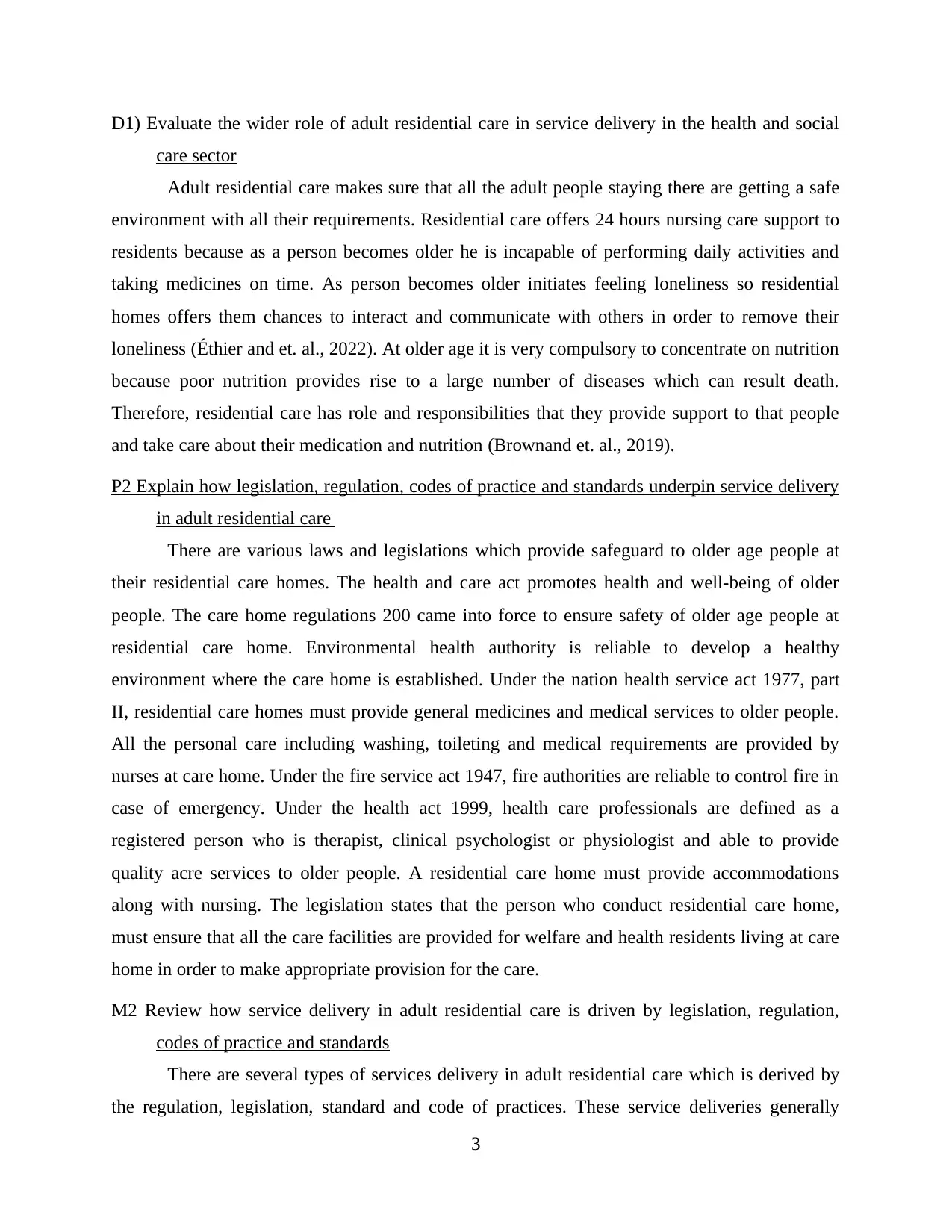
D1) Evaluate the wider role of adult residential care in service delivery in the health and social
care sector
Adult residential care makes sure that all the adult people staying there are getting a safe
environment with all their requirements. Residential care offers 24 hours nursing care support to
residents because as a person becomes older he is incapable of performing daily activities and
taking medicines on time. As person becomes older initiates feeling loneliness so residential
homes offers them chances to interact and communicate with others in order to remove their
loneliness (Éthier and et. al., 2022). At older age it is very compulsory to concentrate on nutrition
because poor nutrition provides rise to a large number of diseases which can result death.
Therefore, residential care has role and responsibilities that they provide support to that people
and take care about their medication and nutrition (Brownand et. al., 2019).
P2 Explain how legislation, regulation, codes of practice and standards underpin service delivery
in adult residential care
There are various laws and legislations which provide safeguard to older age people at
their residential care homes. The health and care act promotes health and well-being of older
people. The care home regulations 200 came into force to ensure safety of older age people at
residential care home. Environmental health authority is reliable to develop a healthy
environment where the care home is established. Under the nation health service act 1977, part
II, residential care homes must provide general medicines and medical services to older people.
All the personal care including washing, toileting and medical requirements are provided by
nurses at care home. Under the fire service act 1947, fire authorities are reliable to control fire in
case of emergency. Under the health act 1999, health care professionals are defined as a
registered person who is therapist, clinical psychologist or physiologist and able to provide
quality acre services to older people. A residential care home must provide accommodations
along with nursing. The legislation states that the person who conduct residential care home,
must ensure that all the care facilities are provided for welfare and health residents living at care
home in order to make appropriate provision for the care.
M2 Review how service delivery in adult residential care is driven by legislation, regulation,
codes of practice and standards
There are several types of services delivery in adult residential care which is derived by
the regulation, legislation, standard and code of practices. These service deliveries generally
3
care sector
Adult residential care makes sure that all the adult people staying there are getting a safe
environment with all their requirements. Residential care offers 24 hours nursing care support to
residents because as a person becomes older he is incapable of performing daily activities and
taking medicines on time. As person becomes older initiates feeling loneliness so residential
homes offers them chances to interact and communicate with others in order to remove their
loneliness (Éthier and et. al., 2022). At older age it is very compulsory to concentrate on nutrition
because poor nutrition provides rise to a large number of diseases which can result death.
Therefore, residential care has role and responsibilities that they provide support to that people
and take care about their medication and nutrition (Brownand et. al., 2019).
P2 Explain how legislation, regulation, codes of practice and standards underpin service delivery
in adult residential care
There are various laws and legislations which provide safeguard to older age people at
their residential care homes. The health and care act promotes health and well-being of older
people. The care home regulations 200 came into force to ensure safety of older age people at
residential care home. Environmental health authority is reliable to develop a healthy
environment where the care home is established. Under the nation health service act 1977, part
II, residential care homes must provide general medicines and medical services to older people.
All the personal care including washing, toileting and medical requirements are provided by
nurses at care home. Under the fire service act 1947, fire authorities are reliable to control fire in
case of emergency. Under the health act 1999, health care professionals are defined as a
registered person who is therapist, clinical psychologist or physiologist and able to provide
quality acre services to older people. A residential care home must provide accommodations
along with nursing. The legislation states that the person who conduct residential care home,
must ensure that all the care facilities are provided for welfare and health residents living at care
home in order to make appropriate provision for the care.
M2 Review how service delivery in adult residential care is driven by legislation, regulation,
codes of practice and standards
There are several types of services delivery in adult residential care which is derived by
the regulation, legislation, standard and code of practices. These service deliveries generally
3
⊘ This is a preview!⊘
Do you want full access?
Subscribe today to unlock all pages.

Trusted by 1+ million students worldwide
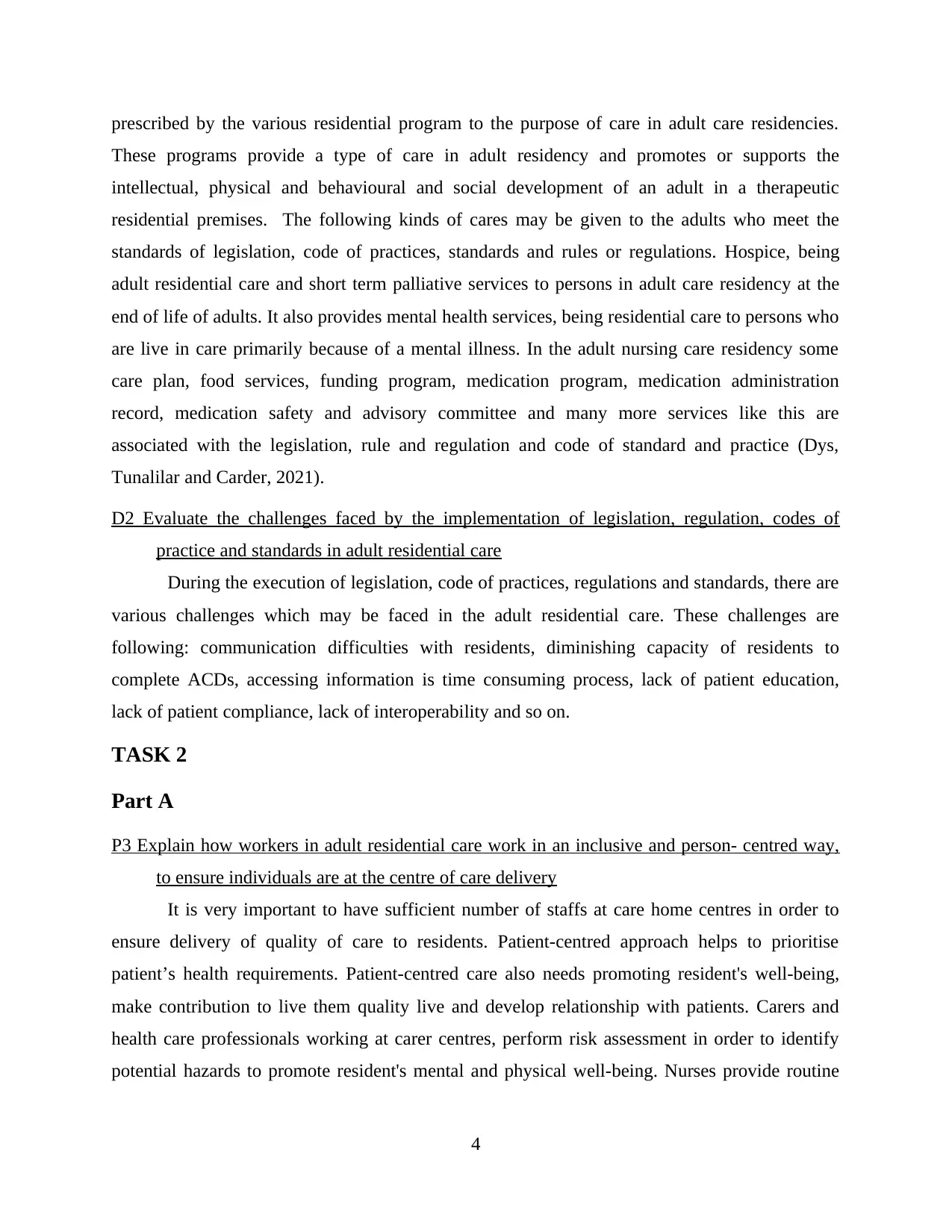
prescribed by the various residential program to the purpose of care in adult care residencies.
These programs provide a type of care in adult residency and promotes or supports the
intellectual, physical and behavioural and social development of an adult in a therapeutic
residential premises. The following kinds of cares may be given to the adults who meet the
standards of legislation, code of practices, standards and rules or regulations. Hospice, being
adult residential care and short term palliative services to persons in adult care residency at the
end of life of adults. It also provides mental health services, being residential care to persons who
are live in care primarily because of a mental illness. In the adult nursing care residency some
care plan, food services, funding program, medication program, medication administration
record, medication safety and advisory committee and many more services like this are
associated with the legislation, rule and regulation and code of standard and practice (Dys,
Tunalilar and Carder, 2021).
D2 Evaluate the challenges faced by the implementation of legislation, regulation, codes of
practice and standards in adult residential care
During the execution of legislation, code of practices, regulations and standards, there are
various challenges which may be faced in the adult residential care. These challenges are
following: communication difficulties with residents, diminishing capacity of residents to
complete ACDs, accessing information is time consuming process, lack of patient education,
lack of patient compliance, lack of interoperability and so on.
TASK 2
Part A
P3 Explain how workers in adult residential care work in an inclusive and person- centred way,
to ensure individuals are at the centre of care delivery
It is very important to have sufficient number of staffs at care home centres in order to
ensure delivery of quality of care to residents. Patient-centred approach helps to prioritise
patient’s health requirements. Patient-centred care also needs promoting resident's well-being,
make contribution to live them quality live and develop relationship with patients. Carers and
health care professionals working at carer centres, perform risk assessment in order to identify
potential hazards to promote resident's mental and physical well-being. Nurses provide routine
4
These programs provide a type of care in adult residency and promotes or supports the
intellectual, physical and behavioural and social development of an adult in a therapeutic
residential premises. The following kinds of cares may be given to the adults who meet the
standards of legislation, code of practices, standards and rules or regulations. Hospice, being
adult residential care and short term palliative services to persons in adult care residency at the
end of life of adults. It also provides mental health services, being residential care to persons who
are live in care primarily because of a mental illness. In the adult nursing care residency some
care plan, food services, funding program, medication program, medication administration
record, medication safety and advisory committee and many more services like this are
associated with the legislation, rule and regulation and code of standard and practice (Dys,
Tunalilar and Carder, 2021).
D2 Evaluate the challenges faced by the implementation of legislation, regulation, codes of
practice and standards in adult residential care
During the execution of legislation, code of practices, regulations and standards, there are
various challenges which may be faced in the adult residential care. These challenges are
following: communication difficulties with residents, diminishing capacity of residents to
complete ACDs, accessing information is time consuming process, lack of patient education,
lack of patient compliance, lack of interoperability and so on.
TASK 2
Part A
P3 Explain how workers in adult residential care work in an inclusive and person- centred way,
to ensure individuals are at the centre of care delivery
It is very important to have sufficient number of staffs at care home centres in order to
ensure delivery of quality of care to residents. Patient-centred approach helps to prioritise
patient’s health requirements. Patient-centred care also needs promoting resident's well-being,
make contribution to live them quality live and develop relationship with patients. Carers and
health care professionals working at carer centres, perform risk assessment in order to identify
potential hazards to promote resident's mental and physical well-being. Nurses provide routine
4
Paraphrase This Document
Need a fresh take? Get an instant paraphrase of this document with our AI Paraphraser
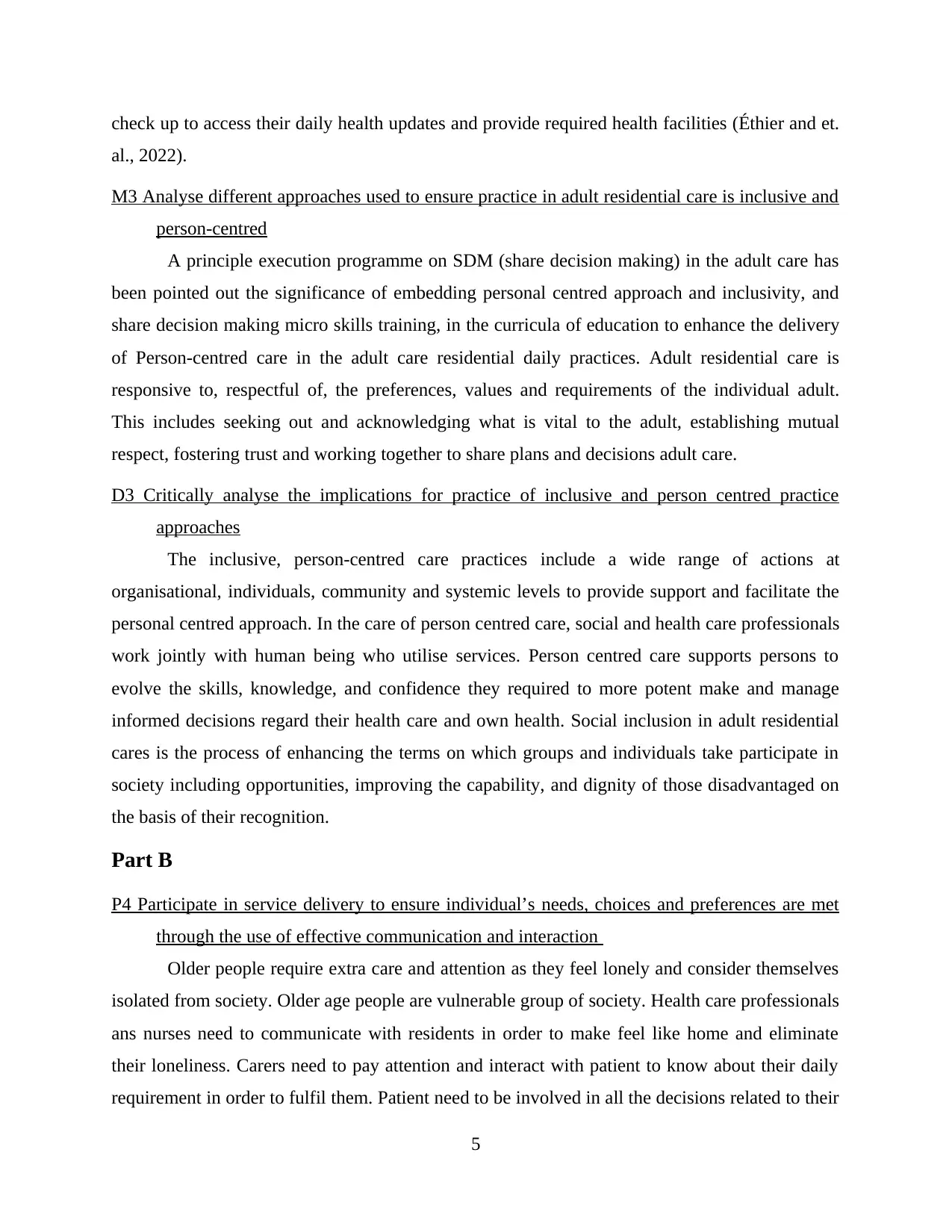
check up to access their daily health updates and provide required health facilities (Éthier and et.
al., 2022).
M3 Analyse different approaches used to ensure practice in adult residential care is inclusive and
person-centred
A principle execution programme on SDM (share decision making) in the adult care has
been pointed out the significance of embedding personal centred approach and inclusivity, and
share decision making micro skills training, in the curricula of education to enhance the delivery
of Person-centred care in the adult care residential daily practices. Adult residential care is
responsive to, respectful of, the preferences, values and requirements of the individual adult.
This includes seeking out and acknowledging what is vital to the adult, establishing mutual
respect, fostering trust and working together to share plans and decisions adult care.
D3 Critically analyse the implications for practice of inclusive and person centred practice
approaches
The inclusive, person-centred care practices include a wide range of actions at
organisational, individuals, community and systemic levels to provide support and facilitate the
personal centred approach. In the care of person centred care, social and health care professionals
work jointly with human being who utilise services. Person centred care supports persons to
evolve the skills, knowledge, and confidence they required to more potent make and manage
informed decisions regard their health care and own health. Social inclusion in adult residential
cares is the process of enhancing the terms on which groups and individuals take participate in
society including opportunities, improving the capability, and dignity of those disadvantaged on
the basis of their recognition.
Part B
P4 Participate in service delivery to ensure individual’s needs, choices and preferences are met
through the use of effective communication and interaction
Older people require extra care and attention as they feel lonely and consider themselves
isolated from society. Older age people are vulnerable group of society. Health care professionals
ans nurses need to communicate with residents in order to make feel like home and eliminate
their loneliness. Carers need to pay attention and interact with patient to know about their daily
requirement in order to fulfil them. Patient need to be involved in all the decisions related to their
5
al., 2022).
M3 Analyse different approaches used to ensure practice in adult residential care is inclusive and
person-centred
A principle execution programme on SDM (share decision making) in the adult care has
been pointed out the significance of embedding personal centred approach and inclusivity, and
share decision making micro skills training, in the curricula of education to enhance the delivery
of Person-centred care in the adult care residential daily practices. Adult residential care is
responsive to, respectful of, the preferences, values and requirements of the individual adult.
This includes seeking out and acknowledging what is vital to the adult, establishing mutual
respect, fostering trust and working together to share plans and decisions adult care.
D3 Critically analyse the implications for practice of inclusive and person centred practice
approaches
The inclusive, person-centred care practices include a wide range of actions at
organisational, individuals, community and systemic levels to provide support and facilitate the
personal centred approach. In the care of person centred care, social and health care professionals
work jointly with human being who utilise services. Person centred care supports persons to
evolve the skills, knowledge, and confidence they required to more potent make and manage
informed decisions regard their health care and own health. Social inclusion in adult residential
cares is the process of enhancing the terms on which groups and individuals take participate in
society including opportunities, improving the capability, and dignity of those disadvantaged on
the basis of their recognition.
Part B
P4 Participate in service delivery to ensure individual’s needs, choices and preferences are met
through the use of effective communication and interaction
Older people require extra care and attention as they feel lonely and consider themselves
isolated from society. Older age people are vulnerable group of society. Health care professionals
ans nurses need to communicate with residents in order to make feel like home and eliminate
their loneliness. Carers need to pay attention and interact with patient to know about their daily
requirement in order to fulfil them. Patient need to be involved in all the decisions related to their
5
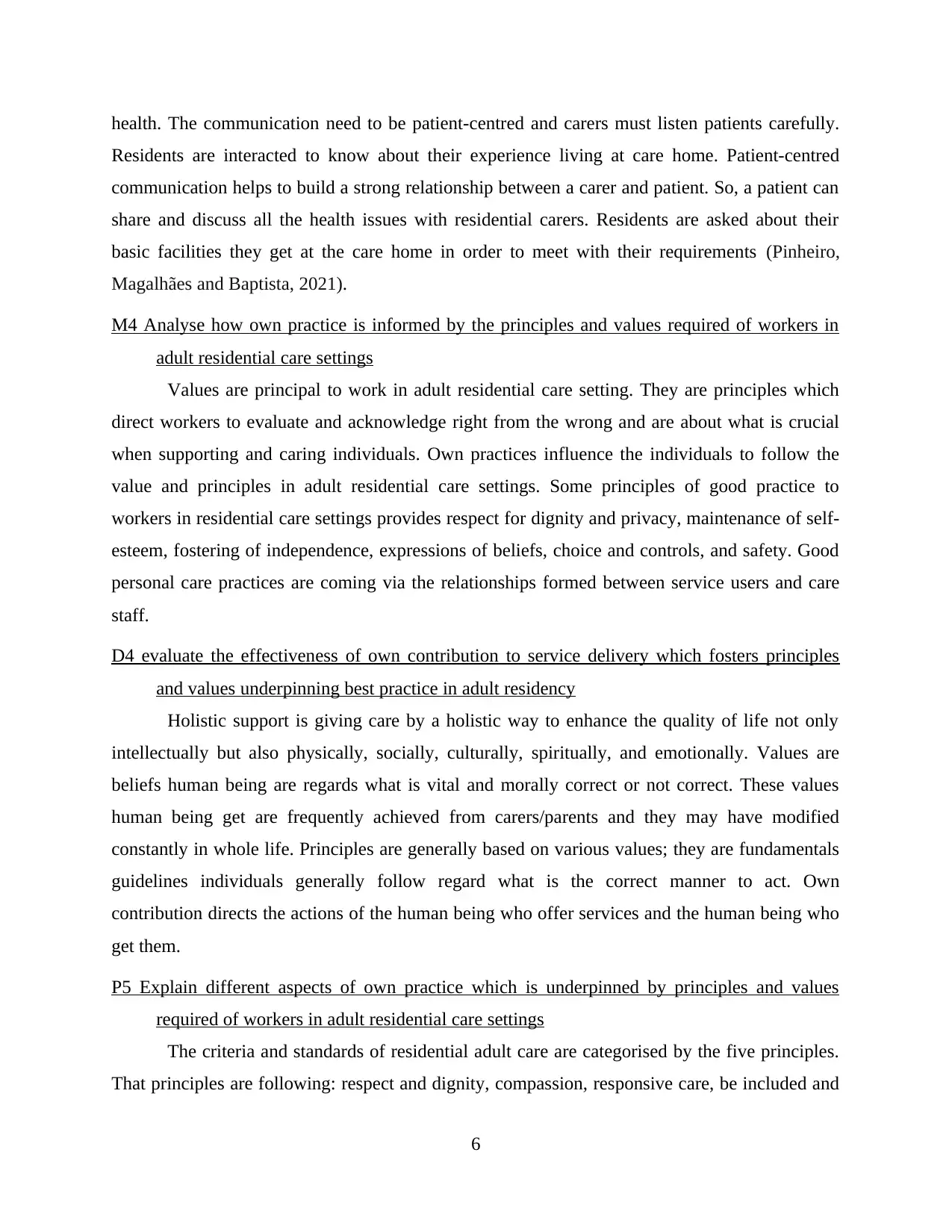
health. The communication need to be patient-centred and carers must listen patients carefully.
Residents are interacted to know about their experience living at care home. Patient-centred
communication helps to build a strong relationship between a carer and patient. So, a patient can
share and discuss all the health issues with residential carers. Residents are asked about their
basic facilities they get at the care home in order to meet with their requirements (Pinheiro,
Magalhães and Baptista, 2021).
M4 Analyse how own practice is informed by the principles and values required of workers in
adult residential care settings
Values are principal to work in adult residential care setting. They are principles which
direct workers to evaluate and acknowledge right from the wrong and are about what is crucial
when supporting and caring individuals. Own practices influence the individuals to follow the
value and principles in adult residential care settings. Some principles of good practice to
workers in residential care settings provides respect for dignity and privacy, maintenance of self-
esteem, fostering of independence, expressions of beliefs, choice and controls, and safety. Good
personal care practices are coming via the relationships formed between service users and care
staff.
D4 evaluate the effectiveness of own contribution to service delivery which fosters principles
and values underpinning best practice in adult residency
Holistic support is giving care by a holistic way to enhance the quality of life not only
intellectually but also physically, socially, culturally, spiritually, and emotionally. Values are
beliefs human being are regards what is vital and morally correct or not correct. These values
human being get are frequently achieved from carers/parents and they may have modified
constantly in whole life. Principles are generally based on various values; they are fundamentals
guidelines individuals generally follow regard what is the correct manner to act. Own
contribution directs the actions of the human being who offer services and the human being who
get them.
P5 Explain different aspects of own practice which is underpinned by principles and values
required of workers in adult residential care settings
The criteria and standards of residential adult care are categorised by the five principles.
That principles are following: respect and dignity, compassion, responsive care, be included and
6
Residents are interacted to know about their experience living at care home. Patient-centred
communication helps to build a strong relationship between a carer and patient. So, a patient can
share and discuss all the health issues with residential carers. Residents are asked about their
basic facilities they get at the care home in order to meet with their requirements (Pinheiro,
Magalhães and Baptista, 2021).
M4 Analyse how own practice is informed by the principles and values required of workers in
adult residential care settings
Values are principal to work in adult residential care setting. They are principles which
direct workers to evaluate and acknowledge right from the wrong and are about what is crucial
when supporting and caring individuals. Own practices influence the individuals to follow the
value and principles in adult residential care settings. Some principles of good practice to
workers in residential care settings provides respect for dignity and privacy, maintenance of self-
esteem, fostering of independence, expressions of beliefs, choice and controls, and safety. Good
personal care practices are coming via the relationships formed between service users and care
staff.
D4 evaluate the effectiveness of own contribution to service delivery which fosters principles
and values underpinning best practice in adult residency
Holistic support is giving care by a holistic way to enhance the quality of life not only
intellectually but also physically, socially, culturally, spiritually, and emotionally. Values are
beliefs human being are regards what is vital and morally correct or not correct. These values
human being get are frequently achieved from carers/parents and they may have modified
constantly in whole life. Principles are generally based on various values; they are fundamentals
guidelines individuals generally follow regard what is the correct manner to act. Own
contribution directs the actions of the human being who offer services and the human being who
get them.
P5 Explain different aspects of own practice which is underpinned by principles and values
required of workers in adult residential care settings
The criteria and standards of residential adult care are categorised by the five principles.
That principles are following: respect and dignity, compassion, responsive care, be included and
6
⊘ This is a preview!⊘
Do you want full access?
Subscribe today to unlock all pages.

Trusted by 1+ million students worldwide
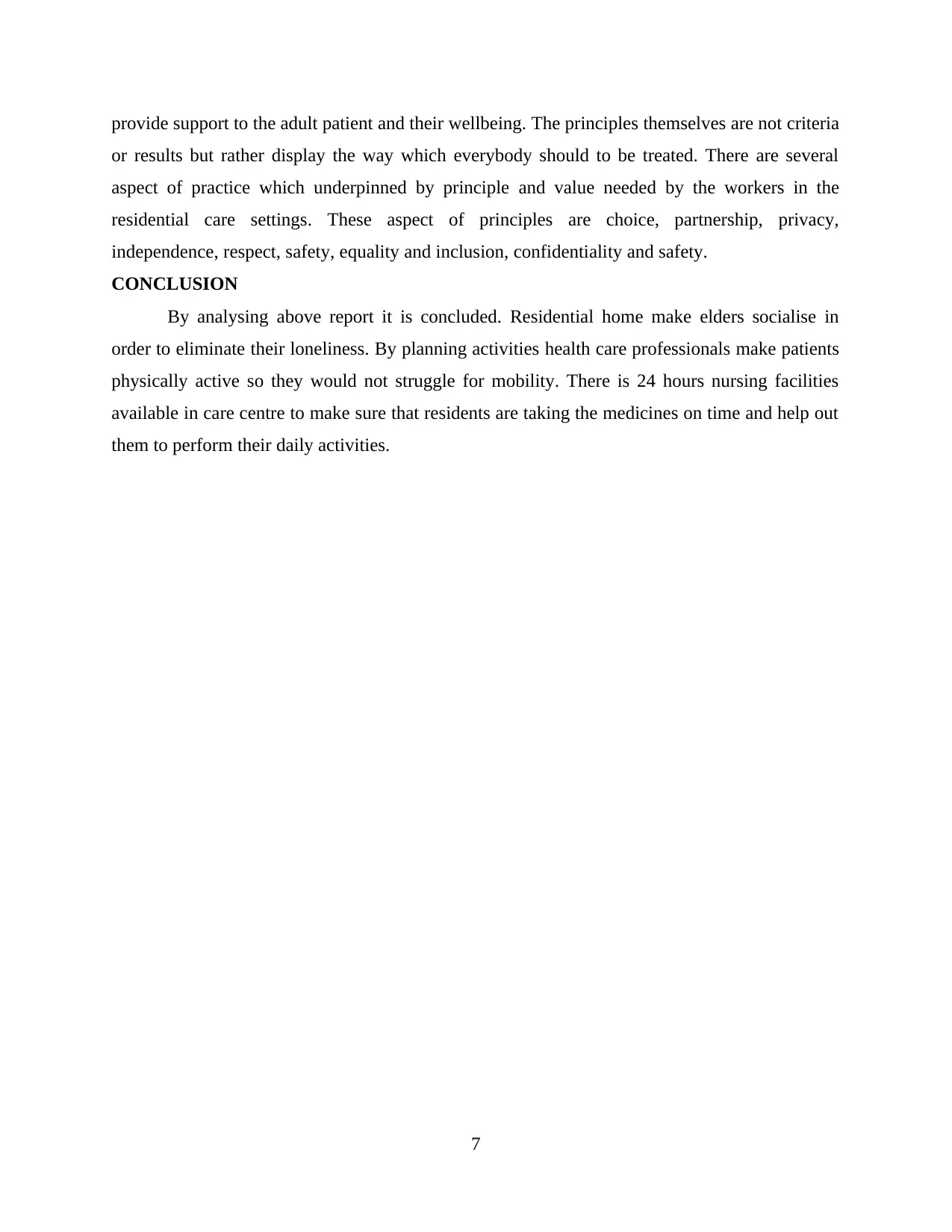
provide support to the adult patient and their wellbeing. The principles themselves are not criteria
or results but rather display the way which everybody should to be treated. There are several
aspect of practice which underpinned by principle and value needed by the workers in the
residential care settings. These aspect of principles are choice, partnership, privacy,
independence, respect, safety, equality and inclusion, confidentiality and safety.
CONCLUSION
By analysing above report it is concluded. Residential home make elders socialise in
order to eliminate their loneliness. By planning activities health care professionals make patients
physically active so they would not struggle for mobility. There is 24 hours nursing facilities
available in care centre to make sure that residents are taking the medicines on time and help out
them to perform their daily activities.
7
or results but rather display the way which everybody should to be treated. There are several
aspect of practice which underpinned by principle and value needed by the workers in the
residential care settings. These aspect of principles are choice, partnership, privacy,
independence, respect, safety, equality and inclusion, confidentiality and safety.
CONCLUSION
By analysing above report it is concluded. Residential home make elders socialise in
order to eliminate their loneliness. By planning activities health care professionals make patients
physically active so they would not struggle for mobility. There is 24 hours nursing facilities
available in care centre to make sure that residents are taking the medicines on time and help out
them to perform their daily activities.
7
Paraphrase This Document
Need a fresh take? Get an instant paraphrase of this document with our AI Paraphraser
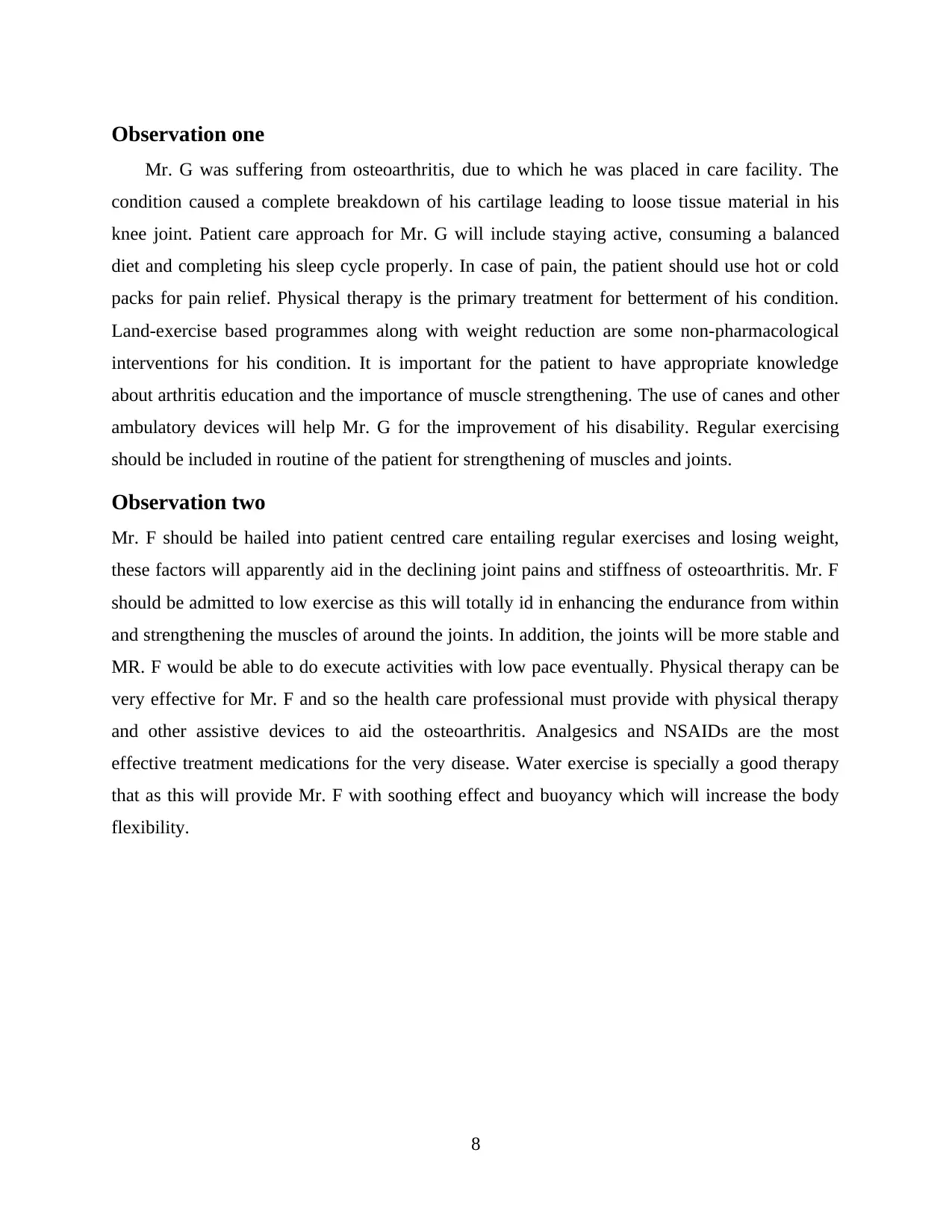
Observation one
Mr. G was suffering from osteoarthritis, due to which he was placed in care facility. The
condition caused a complete breakdown of his cartilage leading to loose tissue material in his
knee joint. Patient care approach for Mr. G will include staying active, consuming a balanced
diet and completing his sleep cycle properly. In case of pain, the patient should use hot or cold
packs for pain relief. Physical therapy is the primary treatment for betterment of his condition.
Land-exercise based programmes along with weight reduction are some non-pharmacological
interventions for his condition. It is important for the patient to have appropriate knowledge
about arthritis education and the importance of muscle strengthening. The use of canes and other
ambulatory devices will help Mr. G for the improvement of his disability. Regular exercising
should be included in routine of the patient for strengthening of muscles and joints.
Observation two
Mr. F should be hailed into patient centred care entailing regular exercises and losing weight,
these factors will apparently aid in the declining joint pains and stiffness of osteoarthritis. Mr. F
should be admitted to low exercise as this will totally id in enhancing the endurance from within
and strengthening the muscles of around the joints. In addition, the joints will be more stable and
MR. F would be able to do execute activities with low pace eventually. Physical therapy can be
very effective for Mr. F and so the health care professional must provide with physical therapy
and other assistive devices to aid the osteoarthritis. Analgesics and NSAIDs are the most
effective treatment medications for the very disease. Water exercise is specially a good therapy
that as this will provide Mr. F with soothing effect and buoyancy which will increase the body
flexibility.
8
Mr. G was suffering from osteoarthritis, due to which he was placed in care facility. The
condition caused a complete breakdown of his cartilage leading to loose tissue material in his
knee joint. Patient care approach for Mr. G will include staying active, consuming a balanced
diet and completing his sleep cycle properly. In case of pain, the patient should use hot or cold
packs for pain relief. Physical therapy is the primary treatment for betterment of his condition.
Land-exercise based programmes along with weight reduction are some non-pharmacological
interventions for his condition. It is important for the patient to have appropriate knowledge
about arthritis education and the importance of muscle strengthening. The use of canes and other
ambulatory devices will help Mr. G for the improvement of his disability. Regular exercising
should be included in routine of the patient for strengthening of muscles and joints.
Observation two
Mr. F should be hailed into patient centred care entailing regular exercises and losing weight,
these factors will apparently aid in the declining joint pains and stiffness of osteoarthritis. Mr. F
should be admitted to low exercise as this will totally id in enhancing the endurance from within
and strengthening the muscles of around the joints. In addition, the joints will be more stable and
MR. F would be able to do execute activities with low pace eventually. Physical therapy can be
very effective for Mr. F and so the health care professional must provide with physical therapy
and other assistive devices to aid the osteoarthritis. Analgesics and NSAIDs are the most
effective treatment medications for the very disease. Water exercise is specially a good therapy
that as this will provide Mr. F with soothing effect and buoyancy which will increase the body
flexibility.
8
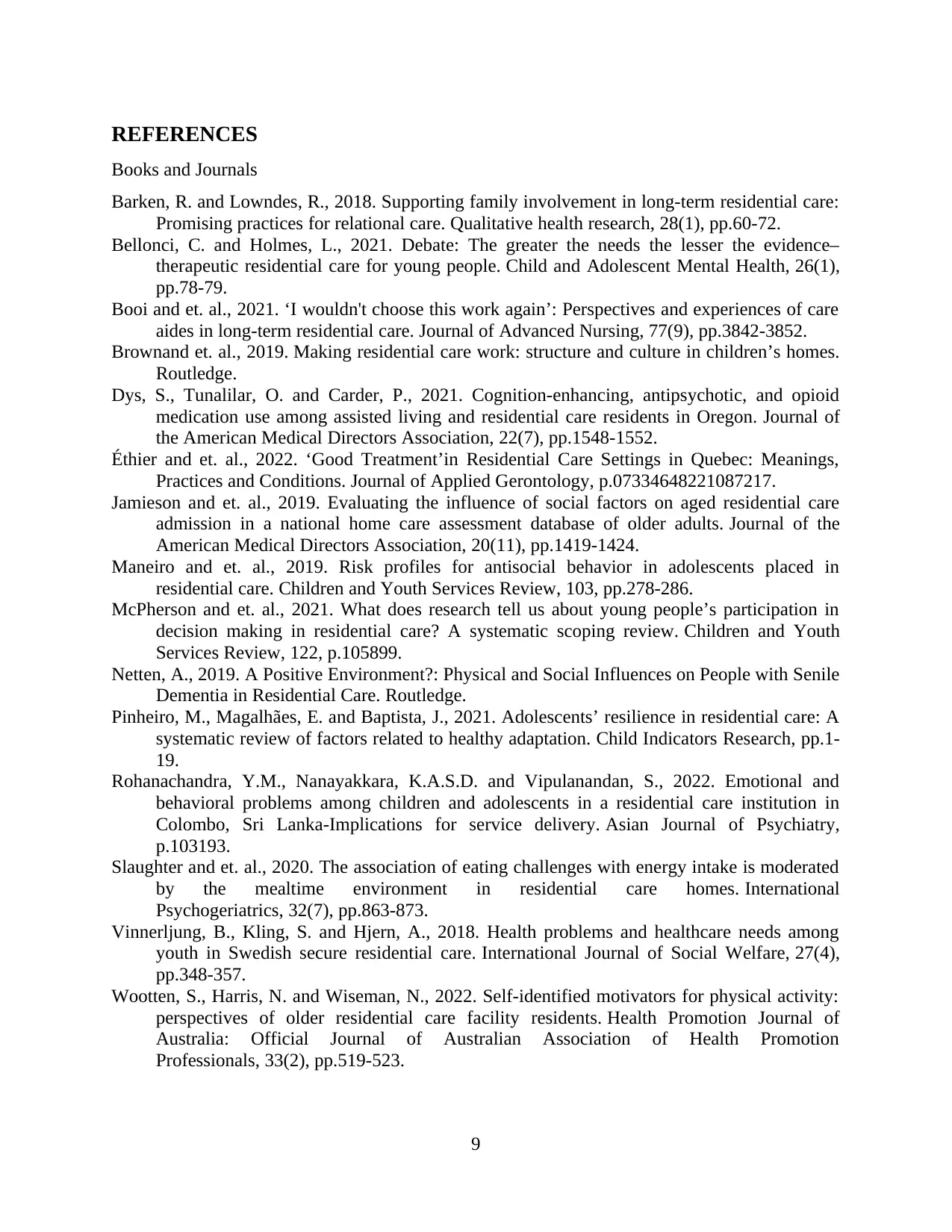
REFERENCES
Books and Journals
Barken, R. and Lowndes, R., 2018. Supporting family involvement in long-term residential care:
Promising practices for relational care. Qualitative health research, 28(1), pp.60-72.
Bellonci, C. and Holmes, L., 2021. Debate: The greater the needs the lesser the evidence–
therapeutic residential care for young people. Child and Adolescent Mental Health, 26(1),
pp.78-79.
Booi and et. al., 2021. ‘I wouldn't choose this work again’: Perspectives and experiences of care
aides in long‐term residential care. Journal of Advanced Nursing, 77(9), pp.3842-3852.
Brownand et. al., 2019. Making residential care work: structure and culture in children’s homes.
Routledge.
Dys, S., Tunalilar, O. and Carder, P., 2021. Cognition-enhancing, antipsychotic, and opioid
medication use among assisted living and residential care residents in Oregon. Journal of
the American Medical Directors Association, 22(7), pp.1548-1552.
Éthier and et. al., 2022. ‘Good Treatment’in Residential Care Settings in Quebec: Meanings,
Practices and Conditions. Journal of Applied Gerontology, p.07334648221087217.
Jamieson and et. al., 2019. Evaluating the influence of social factors on aged residential care
admission in a national home care assessment database of older adults. Journal of the
American Medical Directors Association, 20(11), pp.1419-1424.
Maneiro and et. al., 2019. Risk profiles for antisocial behavior in adolescents placed in
residential care. Children and Youth Services Review, 103, pp.278-286.
McPherson and et. al., 2021. What does research tell us about young people’s participation in
decision making in residential care? A systematic scoping review. Children and Youth
Services Review, 122, p.105899.
Netten, A., 2019. A Positive Environment?: Physical and Social Influences on People with Senile
Dementia in Residential Care. Routledge.
Pinheiro, M., Magalhães, E. and Baptista, J., 2021. Adolescents’ resilience in residential care: A
systematic review of factors related to healthy adaptation. Child Indicators Research, pp.1-
19.
Rohanachandra, Y.M., Nanayakkara, K.A.S.D. and Vipulanandan, S., 2022. Emotional and
behavioral problems among children and adolescents in a residential care institution in
Colombo, Sri Lanka-Implications for service delivery. Asian Journal of Psychiatry,
p.103193.
Slaughter and et. al., 2020. The association of eating challenges with energy intake is moderated
by the mealtime environment in residential care homes. International
Psychogeriatrics, 32(7), pp.863-873.
Vinnerljung, B., Kling, S. and Hjern, A., 2018. Health problems and healthcare needs among
youth in Swedish secure residential care. International Journal of Social Welfare, 27(4),
pp.348-357.
Wootten, S., Harris, N. and Wiseman, N., 2022. Self-identified motivators for physical activity:
perspectives of older residential care facility residents. Health Promotion Journal of
Australia: Official Journal of Australian Association of Health Promotion
Professionals, 33(2), pp.519-523.
9
Books and Journals
Barken, R. and Lowndes, R., 2018. Supporting family involvement in long-term residential care:
Promising practices for relational care. Qualitative health research, 28(1), pp.60-72.
Bellonci, C. and Holmes, L., 2021. Debate: The greater the needs the lesser the evidence–
therapeutic residential care for young people. Child and Adolescent Mental Health, 26(1),
pp.78-79.
Booi and et. al., 2021. ‘I wouldn't choose this work again’: Perspectives and experiences of care
aides in long‐term residential care. Journal of Advanced Nursing, 77(9), pp.3842-3852.
Brownand et. al., 2019. Making residential care work: structure and culture in children’s homes.
Routledge.
Dys, S., Tunalilar, O. and Carder, P., 2021. Cognition-enhancing, antipsychotic, and opioid
medication use among assisted living and residential care residents in Oregon. Journal of
the American Medical Directors Association, 22(7), pp.1548-1552.
Éthier and et. al., 2022. ‘Good Treatment’in Residential Care Settings in Quebec: Meanings,
Practices and Conditions. Journal of Applied Gerontology, p.07334648221087217.
Jamieson and et. al., 2019. Evaluating the influence of social factors on aged residential care
admission in a national home care assessment database of older adults. Journal of the
American Medical Directors Association, 20(11), pp.1419-1424.
Maneiro and et. al., 2019. Risk profiles for antisocial behavior in adolescents placed in
residential care. Children and Youth Services Review, 103, pp.278-286.
McPherson and et. al., 2021. What does research tell us about young people’s participation in
decision making in residential care? A systematic scoping review. Children and Youth
Services Review, 122, p.105899.
Netten, A., 2019. A Positive Environment?: Physical and Social Influences on People with Senile
Dementia in Residential Care. Routledge.
Pinheiro, M., Magalhães, E. and Baptista, J., 2021. Adolescents’ resilience in residential care: A
systematic review of factors related to healthy adaptation. Child Indicators Research, pp.1-
19.
Rohanachandra, Y.M., Nanayakkara, K.A.S.D. and Vipulanandan, S., 2022. Emotional and
behavioral problems among children and adolescents in a residential care institution in
Colombo, Sri Lanka-Implications for service delivery. Asian Journal of Psychiatry,
p.103193.
Slaughter and et. al., 2020. The association of eating challenges with energy intake is moderated
by the mealtime environment in residential care homes. International
Psychogeriatrics, 32(7), pp.863-873.
Vinnerljung, B., Kling, S. and Hjern, A., 2018. Health problems and healthcare needs among
youth in Swedish secure residential care. International Journal of Social Welfare, 27(4),
pp.348-357.
Wootten, S., Harris, N. and Wiseman, N., 2022. Self-identified motivators for physical activity:
perspectives of older residential care facility residents. Health Promotion Journal of
Australia: Official Journal of Australian Association of Health Promotion
Professionals, 33(2), pp.519-523.
9
⊘ This is a preview!⊘
Do you want full access?
Subscribe today to unlock all pages.

Trusted by 1+ million students worldwide
1 out of 14
Related Documents
Your All-in-One AI-Powered Toolkit for Academic Success.
+13062052269
info@desklib.com
Available 24*7 on WhatsApp / Email
![[object Object]](/_next/static/media/star-bottom.7253800d.svg)
Unlock your academic potential
Copyright © 2020–2026 A2Z Services. All Rights Reserved. Developed and managed by ZUCOL.




